
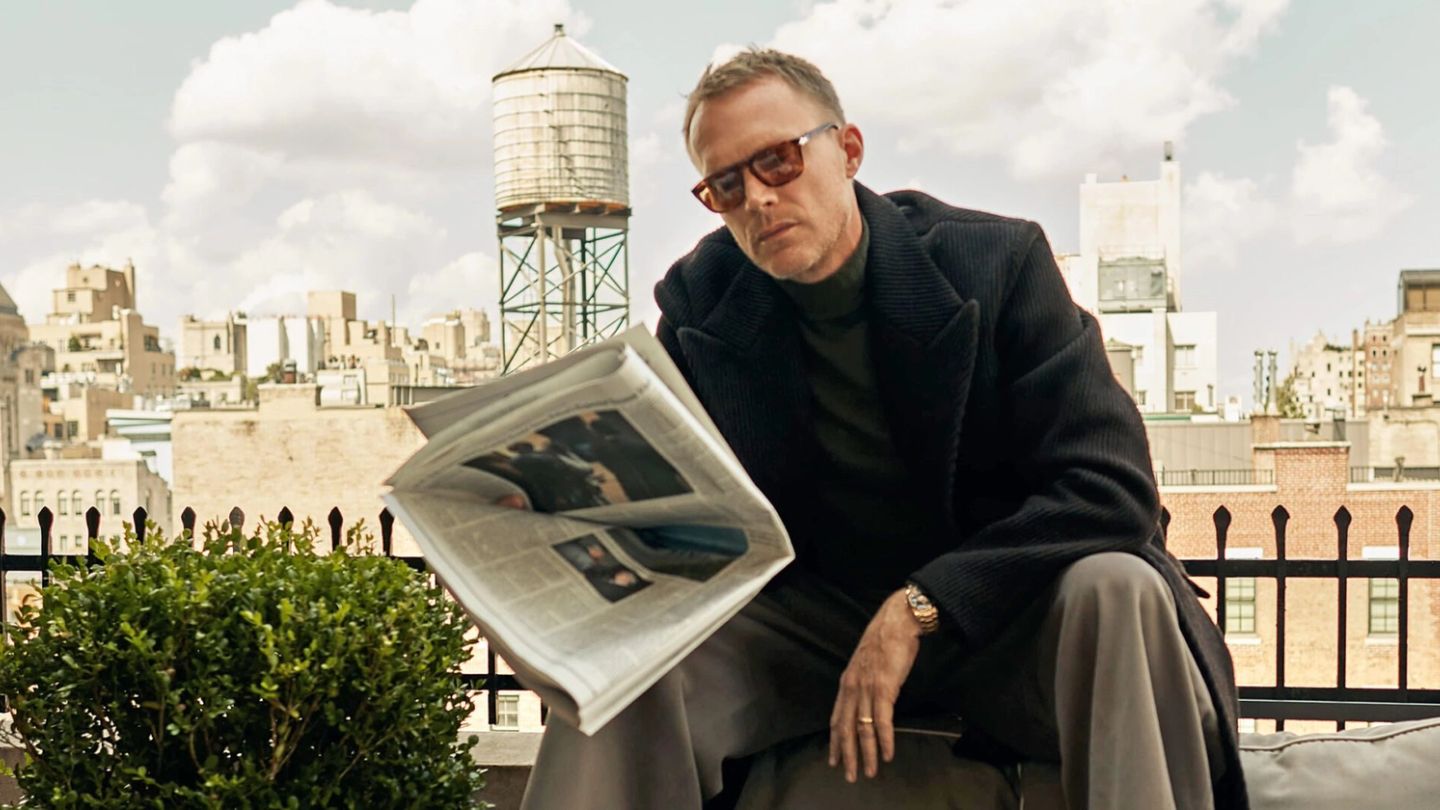
Paul Bettany on fame, playing the game, and staying sane
The actor plays pop artist Andy Warhol in much-anticipated film 'The Collaboration'. But his own artistic process, he explains, is anything but methodical...
- Words: Joseph Bullmore
- Photography: Joseph Bishop
- Stylist: Alicia Lombardini
- Grooming: Laila Hayani
Let’s start with a quote from Andy Warhol, because that’s the sort of magazine this is these days. “The reason I’m painting this way is that I want to be a machine,” the artist said. “I feel that whatever I do and do machine-like is what I want to do.” The actor Paul Bettany is not Andy Warhol, who he plays in a new film called The Collaboration based on the stage production of the same name. This is not much of a scoop, I admit. Bettany isn’t, you might also rightly argue, the purple alien AI thing he plays in Marvel’s WandaVision; or the big-serving tennis professional Peter Colt he appeared as in Wimbledon. That’s just sort of how acting works, and quite right too.
But what I mean to say here is that Paul Bettany is really not Andy Warhol. Or really not Andy Warhol, if you’d rather. The man cannot be machine-like even if he wished to be. I sensed, at various points during our hour-long Zoom call to discuss The Collaboration and a few other things, that it would have been simpler for the actor if he had just stayed in the lane of Junket-Tron-3000 — stock answer; pleasant platitude; ‘fell in love with the script’; mandatory plug. But from behind the always-artificial setting of a promotional interview, plenty of human bits began to naturally emerge — no testament to my rather clunky, nervy, Hugh-Grant-in-chubby-prosthetics interrogation style, I can assure you; but a good indication of the way Bettany is, I hope, both on and off set.
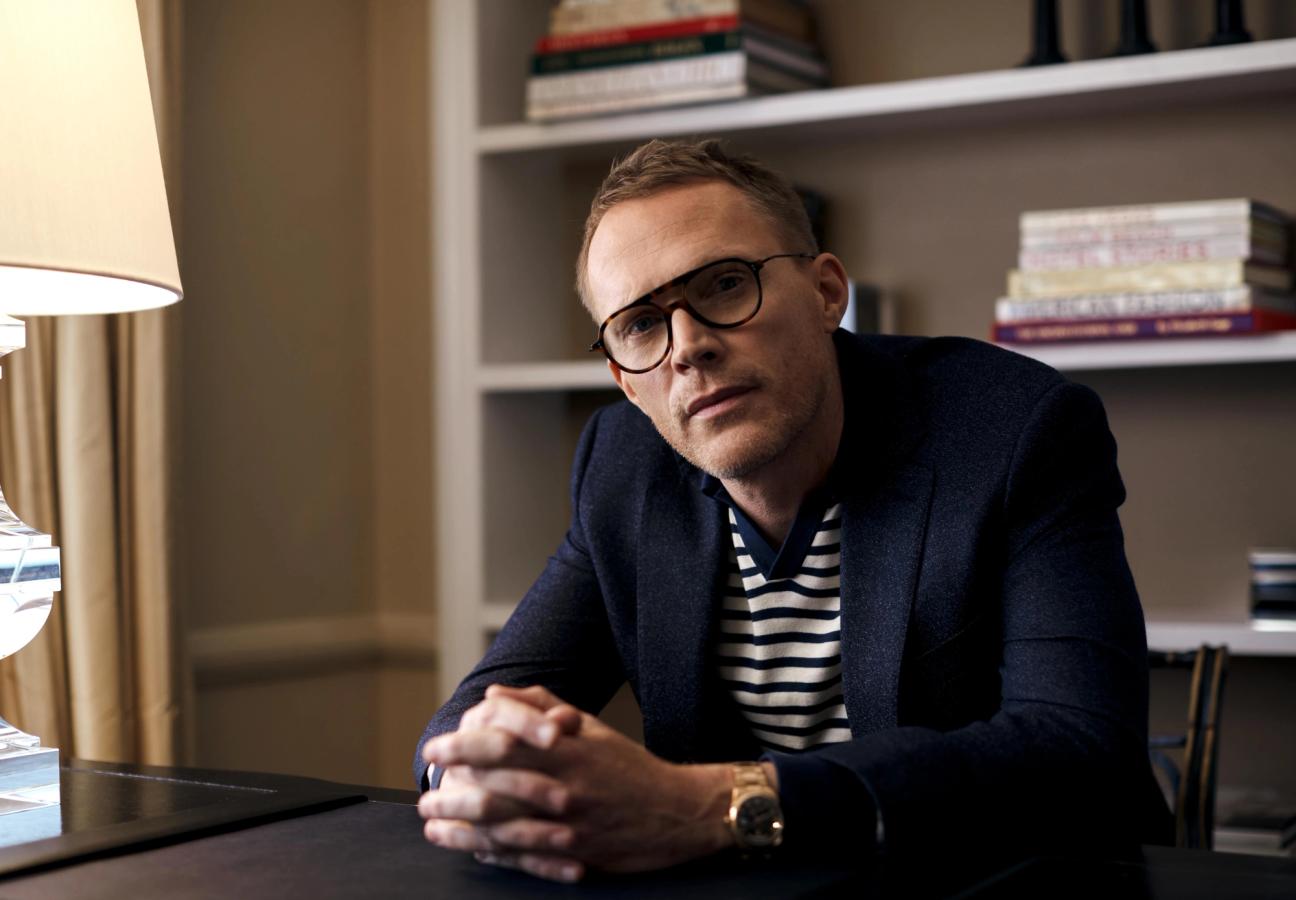
Have you ever wondered, as I did — through onion-chopping-and-dead-childhood-dog tears — how the actor could weep so heart-rippingly authentically in that graveyard scene in the film Uncle Frank? Or about how an actor — any actor — can actually set something like that onto cold, hard celluloid and make us all want to call our parents out of nowhere, or laugh out loud, or smile at our warring spouse, or quit our jobs on the spot? In Bettany’s case, the answer’s simple. You just have to be yourself.
“Some people have amazing access to their emotions, and can switch them on like that,” he explains, sitting some 3000 miles away in a cabin near his house in Vermont. “And I’m just not good enough to do that.” So instead, Bettany explains, “if I find myself in a scene that requires that, I find myself picking at scabs that I’d rather not pick at,” and he mimes a nifty scab pick with his forefinger. For the Uncle Frank scene I mentioned, which is devastatingly brilliant, Bettany has said in interviews before that he kept his younger brother’s sweatshirt with him on set in order to bring up that body-shaking sorrow. His brother died when Bettany was 16. “And it’s like: What am I doing? What am I doing! What the hell am I doing! Sat here in front of a graveyard, thinking about dead people in my life?”
The scab-picking, I try to say, is just part of the artist’s curse (which is made so much worse by people who describe it as anything so silly as ‘the artist’s curse’). It’s just the pain and trouble you have to put yourself in to make something good and meaningful, which gets all the more painful and troublesome when you begin to compare it all to the pain and trouble involved in other, actual jobs — like being a doctor or a nurse, for example. But, I say, with the indulgence of the serially-unpublished novelist, even doctors (never mind the rest of us) need artistically good and true things to help them understand the pain and trouble of the world and their place in it. I hope.
“Yes. If I was going to sit here and sound like a wanker in this piece,” Bettany says, “the thing that can be a little bit helpful is to think of the thing that I feel when I hear John Lennon sing a certain lyric” And he talks a little about the most moving lyric he can think of: Lennon’s ‘Mother, you had me, but I didn’t have you.’ (“His whole psyche and world and childhood breaks open for you in the most muscular sentence,” Bettany says. “I mean it’s unbelievable.”)
“That’s something that makes me feel less alone and alienated in the world and adheres me to the surface of the planet just enough so I’m not feeling like I’m going to spin off into outer space alone,” he says. “Things like that have been helpful to me when I see them or read them; helpful to me in my life. So that’s maybe something you can think about in your writing, and I think about in my stuff.”
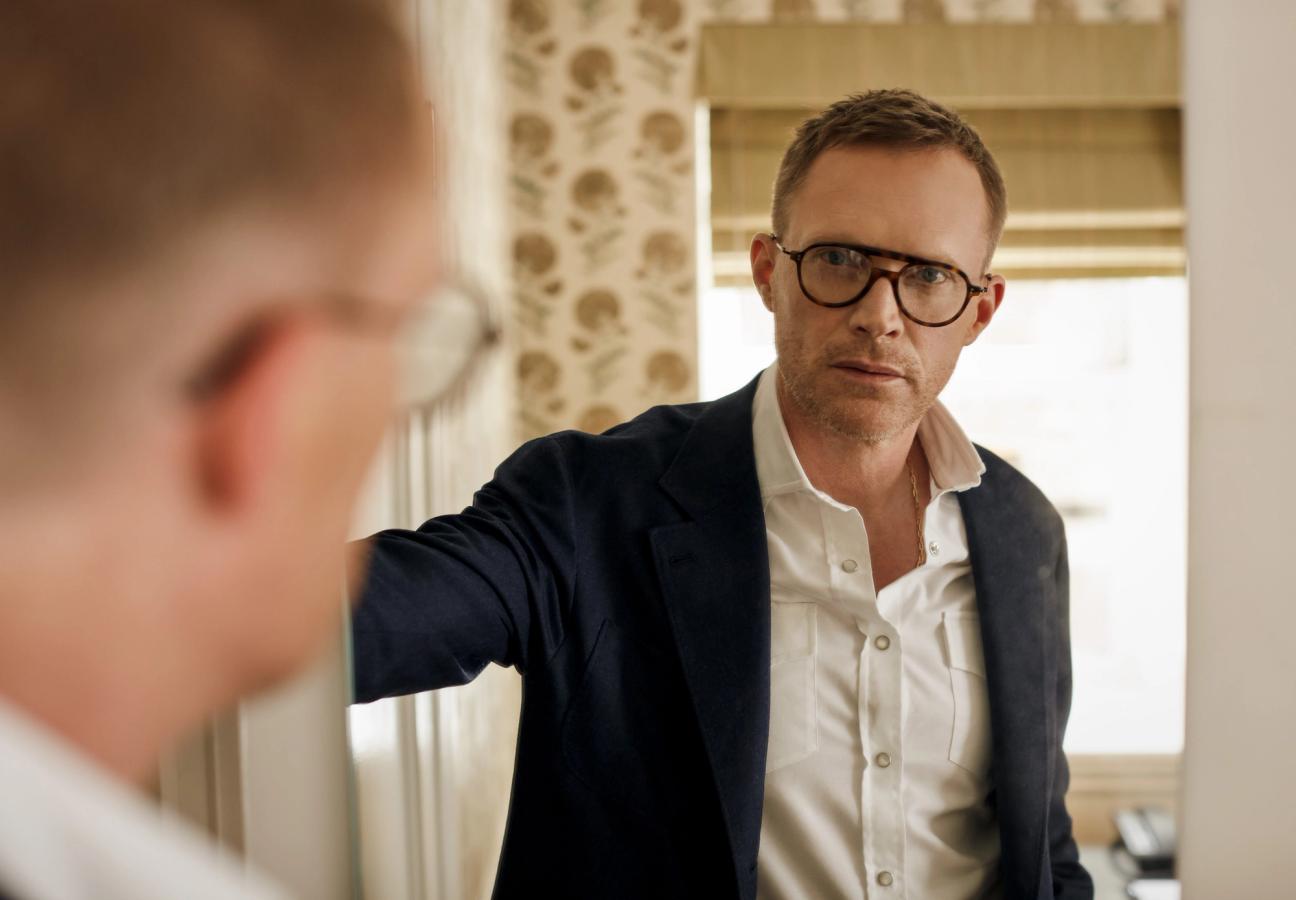
Bettany left school at 16, and originally thought he might be a musician and a songwriter. He used to busk on the streets of Camden, and lived in a grungy flatshare in North London. He almost wretches when I ask him for his best lyric from those teenage days. “Oh god no. Nothing! It was so horrendous,” he says. “I was aiming for somewhere between Paul Weller and Morrissey. But now I’ve given that all up to my son, who is an extraordinary musician.” Stellan, 25, the oldest of his three children with the actor Jennifer Connelly, is a “classical composition-maker at the New England Conservatory in Boston,” Bettany says with pride. “And it became clear to me pretty early on in his learning music that my dreams of wanting to be a guitar player and musician were simply that. I used to think I was in the wrong job. But then it became abundantly clear to me, raising Stellan, that I never had that kind of game.”
"Talking about acting is like talking about sex..."
What kind of game does he have, then, I ask? What does he think makes him a good actor? “Listen — Talking about acting is like talking about sex,” he says. “Sex is a lot of fun to have but so embarassing to have to talk about. I read the shit that other actors say sometimes, and that I say, and I think: what have you just said!? ” He addresses himself for a moment. “Paul: you’re most famous for playing an artificially intelligent robot. It’s like: ‘if one synthetic being can feel just a little less alienated because of my performance it’s all worth it…’” and he laughs at the nonsense of it all. “It’s very tricky”
It is, yes, and it’s mainly my fault. Maybe this is the sort of thing Andy Warhol was trying to avoid when he said he’d rather just be a machine. I ask Bettany about the role in The Collaboration — which is a dialogue, essentially, between Warhol and Basquiat as the older artist takes the younger one under his wing — and how it all came about.
“I didn’t want to play it at first,” Bettany says. “The producer rang me up and asked me if I wanted to play him and I said: ‘absolutely not.’ I said I don’t think there’s a good way to do it. I think that’s why Warhol’s always in cameos: because you’ve only ever seen this really carefully curated public persona — this monosyllabic, lonely creature.” But the producer sent Bettany the diaries, and he read them.
“What’s interesting about them is that they are sort of downloaded to his students’ pads — they aren’t written but dictated over the phone. He is speaking in these long circuitous sentences, and I thought: he sort of sounds more like Truman Capote in my head, and then I read the script which was just terrific, and then I thought there might potentially be a way to do it.” So he did. Quite wonderfully, by all accounts. “Well: I’ll leave it to other people to decide at a later date. The thing is: I’m not even sure Andy Warhol was particularly good at being Andy Warhol. So there’s that, too.”
Warhol, of course, was obsessed with fame. His most-repeated quote is the clinical prediction that “in the future, everyone will be famous for 15 seconds” — an eerily prescient notion in the Time of TikTok, where viral videos tend to last for about that long, and no-one’s really famous because everyone is. Whatever the increment, Paul Bettany’s own fame — and his career, which in Hollywood is the same thing — has come in fits and starts. The 2000s were good to him. He was brilliant in A Beautiful Mind (2001), A Knight’s Tale (2001), The Da Vinci Code (2006) and Wimbledon (2005, and still the best tennis movie going.) But by 2013-ish, he hadn’t worked in nearly two years — and he sometimes tells the story of how he went to a meeting with a movie producer who, he had been warned, “fucking hated” him. True to form, the producer told him he was dead in this town and would never work again. And then, almost exactly as he left the meeting, the director Joss Whedon, who was pulling together the gargantuan Marvel film Avengers Assemble, called him and offered him the part of Vision. He threw a finger to the building behind him, and embarked on his best years yet.
“It comes and goes,” Bettany says about fame now. “The free shit comes and goes. And people finding your jokes funny comes and goes. They’re always the same jokes — but what I’ve noticed is that when you’ve had something that was a big hit, people are laughing more. You get a better table at a restaurant. But it’s spurious and I have watched it, with myself, come and go — it’s an untrustworthy thing. You shouldn’t find solace in it.”
Some parts of it are lovely, he says, and most people are very friendly and pleasant. “And some of the things are genuinely a little alienating — like somebody wanting to come up and have a picture with you, and then when they do you can feel their arm shaking when they put it around you. And you just think: I’m not meeting you, and you’re not meeting me. Or: You’re certainly not meeting the actual me, and I’m not meeting who you really are.”
Bettany recalls the time when he had just been told his father was gravely ill, and that he needed to get on a flight to Scotland immediately to see him. He was standing distraught in the middle of New York City — tears running down his face — when a fan came up and asked for a selfie.
“Are you out of your mind?!,” Bettany says now. “Look at me! But he just hadn’t seen that. He couldn’t. They’re not meeting you. He’s not that mad. He wouldn’t approach anybody else who was crying in the street and do that.” Fame had put the emotional blinkers on, and the fan didn’t see a person but a selfie. I say that I’m sorry to hear about his father. “He was just old,” Bettany just about manages. “It was years ago now.”
"We’re all so hardwired to think it’s all about to end, all the time..."
Later this year, Harvest Moon, a film Bettany wrote with his old friend, the former Vanity Fair deputy editor Dana Brown, will be released. It may well be the first and finest pandemic love story. “My mate Dana had just been through a tumultuous time in his personal life, and he and his wife had got divorced,” Bettany explains of the film’s origin. “And the moment the divorce came in he had to move in with his wife and kid because of lockdown. He was going out of his mind, but I said: “‘that’s hilarious — let’s write it.’”
“It soon became clear that it was a story told by a kid about trying to get the family back together, and through sheer will and determination force out the new guy,” he says. It is the Parent Trap: Covid Edition. “And it sort of has the indolence of those Chekhov short stories — and this is why you can never talk to journalists, because you start to say stuff like that,” Bettany laughs. “Those are all about long summers, and they’re all away from Moscow and they’re bored. And it struck me that the pandemic had that feeling. We were all longing for new people all the time. The kids were up licking the window when the UPS guy came, longing for new humans.”
Bettany met his wife Jennifer Connelly on the set of A Beautiful Mind at the turn of the millennium, and has said before in interviews that it was the events of 9/11 that made him realise he was in love with her. I wonder if he had any other big moments of realisation around the pandemic, that other big, scary, global crisis of our times.
“What I have realised is that I do better than I think in isolation,” he says. “I’m quite convivial and social, and so I’m always surprised to see how well I do with my own company. I feel like I shouldn’t have the personal resources to be on my own at all. I feel like I should fall apart more than I do. But I don’t.”
I ask Bettany about that probably-apocryphal Chinese curse: ‘May you live in interesting times.’ The Queen is dead and Europe is at war. Are these the most ‘interesting times’ that Bettany can remember? “As I get older I get much less definitive about those things and feelings,” he says. “I think it’s interesting to note that Andy Warhol had a period that was all about American vitality and advertising and virility. And then he gets into the American nightmare of paintings like ‘Little Race Riot,’ and then into the art-for-money portraits stuff, which feels very prescient — with the Tik-Tok world, and social media, and all the self-publicising. I think he was clearly onto something. He saw the future quite clearly in that way.”
“But I think it’s also interesting to note that human beings are always thinking the world’s going to end,” Bettany continues. “I think we’re all so hardwired to think it’s all about to end, all of the time.” In 1963, Warhol spoke about his inspiration for a new macabre exhibition in France. “It was Christmas or Labor Day—a holiday—and every time you turned on the radio they said something like, ‘four million are going to die.’” Warhol said to an interviewer. “That started it…” His paintings and prints from that period are dark and bloody. It is rather heartening (and telling) to see how Bettany, faced with similar doom, chose to write a love story, and — spoiler alert — one with a happy ending; a happy family.
What advice does Bettany have for his own children as they navigate these strange times? “The best thing I said to my 19-year-old son recently is that 19 is a great time to make mistakes,” he says. “It’s just fantastic to get it wrong — it’s going to be alright. No-one’s expecting you to make good decisions.” We both agree that being a teenager was exhausting. I say that’s why I’m scared of becoming a parent. It was tiring enough being a kid, let alone having one.
“Yes, but it’s outweighed by the wonderful bits,” Bettany says. “Being a parent is the greatest journey I’ve ever been on. I’ve loved every moment of it. I’m going to say something that will make me sound very earnest and American: but it’s genuinely humbling. It’s an extraordinary thing to see these creatures become their own people.”
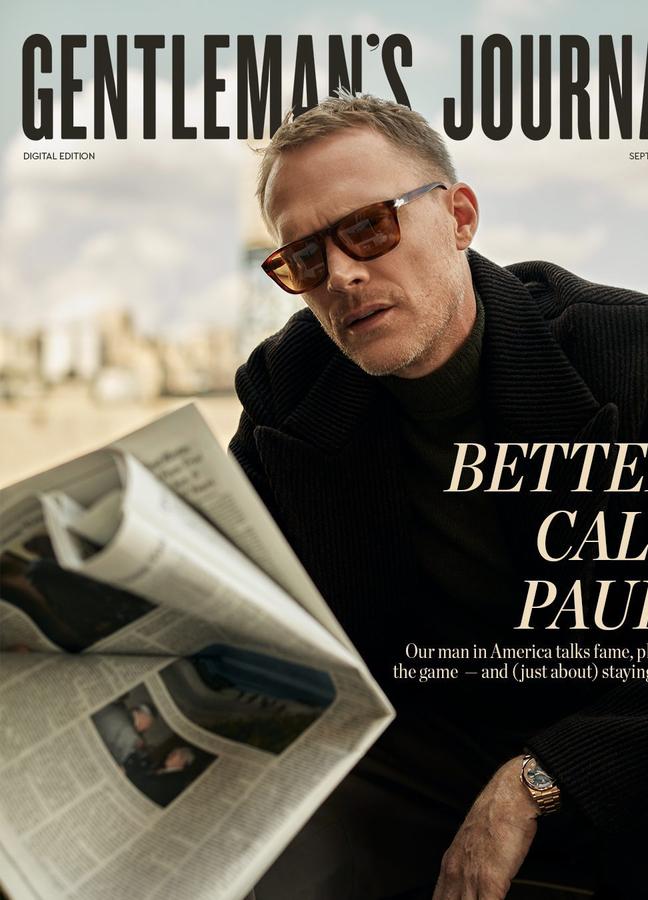
Is there a family mantra in the Bettany household? “If I would ask my son, it would be that I always do this really annoying thing of saying: ‘Finish strong,’” he says. “If you’re working your ass off for your A-levels and your dad goes: ‘finish strong’— I can’t imagine how annoying that is. But it means don’t slow down in the final straight. You’ve got to push through. It’s irritatingly industrious of me. But I have that ethos myself, when I’m up at work and tired and against it.”
Connelly, he says, is the same. “She was in the running team at Stanford — one of the best teams in the world,” he says. “She was slow by their standards — these are olympians. But she was their mascot. They called her ‘death grip’ because she never, ever quit. They’d all be done and she’d still just be running round the track — she’d never quit.”
"In America, people hear my accent and assume I went to Oxbridge…”
Finally, I ask Bettany what advice he would give to his younger self. “People assume that I have a very good education, when in actual fact I left school at 16 and went to a tertiary college to learn to be an actor,” he says of his time busking on the streets of London. “But in America, people hear my accent and assume I went to Oxbridge…” He’s not sure what he’d say to young Paul. “But I was given some great advice by a woman called Lorraine Balterelli. She was an actress, and a student of my father’s. And I remember her saying something to me when I was being difficult and I was feeling very passionate about something. She said: ‘Paul, I want you to remember this. Don’t worry about it now. But just remember: Neurosis is only attractive in your twenties,’” he laughs.
“I did remember that, and I think about it a lot. It’s attractive in your twenties — you’re a rockstar without the gravitas. But it’s frankly embarrassing in your thirties and beyond to be quite so flimsy,” he says, which brings us back to Warhol the Machine and the Uncle Frank graveyard scene and how he acts in general. I tell Bettany that, of all the silly jobs one can do, something like that scene is the least-silly version possible. It is good for the rest of us that Bettany still feels a little neurotic, no matter his age. The flimsiness is not the weakness but the strength. “I’m not any less neurotic now, by the way” he says before we go. “I’m just better at hiding it.” And using it, too, I want to say — which may well be the exact same thing.
This story was shot on location at The Lowell Hotel, Upper East Side, New York City.
Want more of Britain’s brightest talents? Here’s George Ezra on fame, fear — and almost losing his foot (well, sort of…)
Become a Gentleman’s Journal member. Find out more here.
Further reading

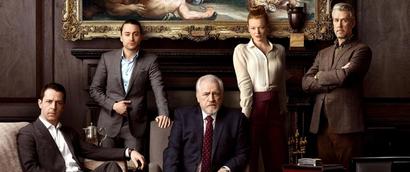
What Patek Philippe Was in Succession

